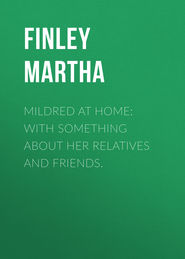По всем вопросам обращайтесь на: info@litportal.ru
(©) 2003-2024.
✖
Signing the Contract and What it Cost
Настройки чтения
Размер шрифта
Высота строк
Поля
“One wild, stormy night I was quite alone,” she continued. “The wind howled round the house like a legion of devils, as it seemed to me, and the air was full of eerie sounds. I had been more than usually depressed all day, and grew worse and worse as the hours crept slowly by. My husband I knew would not be home before morning; one servant was away, and the other had gone to bed in a distant part of the house.
“I wasn’t exactly afraid, but I kept thinking of Ethel, and how I had ill-used her, and that I should probably never see her again, till I was half crazed with remorse. At last I could not endure it any longer. I kept wine in a closet in my dressing-room; I went to it, poured out and drank one glass after another till I was quite stupefied.
“The last thing I remember is dropping into a chair beside the fire – a low-down grate filled with glowing coals; the next I knew I awoke in my bed, roused to consciousness by a sharp pain in my right arm.
“My husband, the servant-woman – who was crying bitterly – and two or three doctors were in the room. They were talking in low tones, and kept glancing at me.
“‘What is the matter?’ I asked; ‘what have you been doing to my hand that it pains me so?’ It was the surgeon nearest me who answered.
“‘Madame,’ he said in a compassionate tone, ‘it was so badly burned that we were obliged to take it off.’
“‘Off! burned!’ I shrieked, wild with terror and despair.
“‘Yes,’ he said, ‘your husband found you lying insensible on the floor, with your right hand in the grate and burnt almost to a cinder.’”
Ethel sprang up, threw her arms about the Madame’s neck, and sobbed aloud.
“My poor, poor aunt!” she said when she could speak. “What a dreadful, dreadful thing it was! My heart aches for you! oh, how could you bear it?”
Madame Le Conte returned the caress, then Ethel resumed her seat.
“I could not escape it!” she sighed, “and I felt that it was a just punishment that deprived me of the hand I had used to forge the notices which robbed my sister of her lover.
“Remorse has tortured me horribly many a time since, but I never have resorted to the intoxicating cup to escape its stings.
“I gave up society from the time of my accident. I could not bear the thought of exposing myself to the curious gaze and questioning of common acquaintances or of strangers.
“My husband pitied me very much, and never once said to me, ‘It is your own fault,’ as well he might. Finding how I shrank from meeting any one I knew, he proposed removing to this city, where we were entirely unknown, and I was glad to come. It is now ten years since he died, leaving me everything he possessed.”
CHAPTER XXXV
A FLITTING
“The keen spirit
Seizes the prompt occasion, makes the thought
Start into instant action, and at once
Plans and performs, resolves and executes!”
Hannah More.
“And all alone!” sighed Ethel, breaking the momentary pause that followed the concluding sentence of the Madame’s story. “Ten years of utter loneliness, save the presence of hired servants – of constant ill-health and mental anguish, besides the dreadful loss of your right hand! My poor, poor aunt, you have indeed suffered horribly and long!”
“Indeed I have, and I hope Heaven will accept it as some atonement! Well, what is it, child: you deem it not sufficient?” as Ethel turned upon her a pained, troubled look.
“Ah, Aunt Nannette,” she said, “there is but one atonement for sin, even the blood of Christ.”
“My sister, my gentle, forgiving little Pansy, would think I had endured far more than enough,” sobbed the Madame in an injured tone, and almost turning her back upon her niece.
Ethel dropped her crocheting, rose hastily, and putting her arms about the Madame’s neck, said soothingly, “Don’t misunderstand me, auntie dear. I did not mean – I could not feel for a moment that my mother or I could wish to add a feather’s weight to all you have suffered, or help grieving over it, or wishing you might have been spared it.”
“What then?” asked the Madame petulantly, and with a movement as if she would free herself from the enfolding arms.
“Only,” Ethel said gently, withdrawing them and resuming her seat, “that sin as committed against God cannot be atoned for by anything that we can do or suffer.”
“I shall try to sleep now,” said the Madame, closing her eyes. “I am exhausted.”
And truly she looked as if she were; her face was haggard and old beyond her years, and her eyes were swollen with weeping.
Ethel’s filled with tears as she gazed upon the careworn, miserable face, and thought how wretched she was in spite of all her wealth; how her wounded spirit would keep her so, even could her hand and health of body be restored.
“Poor thing!” said the young girl to herself, “none but Jesus can do her good, and she will not come to Him.”
Feigned sleep presently became real, and for an hour or more Ethel was to all intents and purposes as much alone as if she had been sole occupant of the room.
She did not move from her chair, but her fingers were busy with her crocheting, her thoughts equally so with the tale to which she had been listening.
It seemed to have made her acquainted with her mother, and she dwelt upon her character, as drawn by Madame Le Conte, with ever-increasing love and admiration.
How she pitied her sorrows – the separation from him who had won her young, guileless heart, the news that he was lost to her, then of his death! Ah how could she bear such tidings of Espy! He would never love another; but he might die. She shivered and turned pale at the very thought. Ah, God grant she might be spared that heart-breaking grief! But should it come, she would live single all her days; she could never be forced or persuaded to do as her mother had done; her nature was less gentle and yielding, better fitted to brave the storms of life. That loveless marriage! ah, how sad! how dreadful the trials that followed!
And her mother had married again. Rolfe Heywood was not really dead, and perhaps – ah yes, it must have been he who had found and won her, he the one whom she had always loved; Ethel was certain of it, certain that none but he could have reconciled her, the bereaved, heart-broken mother, to life, and so quickly gained her for his bride.
And had she forgotten her child in her new-found happiness? the child who was now searching so eagerly, lovingly for her? No, no, the tender mother-love could not be so easily quenched! No doubt unavailing efforts had been made to recover her lost treasure; and though other little ones had perhaps come to share that love, the first-born held her own place in the mother’s heart.
“Oh, when shall I find her? how can I endure this waiting, waiting in suspense? ’Tis the hardest thing in life to bear!” she exclaimed half aloud, forgetting that she was not alone; letting her work fall in her lap while she clasped her hands together over her beating heart and drew a long, sighing breath.
“What – what is it?” cried Madame Le Conte, starting from her sleep and rubbing her eyes. “Has anything happened?”
“No, nothing. How thoughtless I have been to disturb your slumbers!” Ethel said, rising, bending over her, and gently stroking her hair.
“Oh,” sighed the Madame, “it is no matter! my dreams were not pleasant: I am not sorry to have been roused from them. But what is it that you find so hard to bear?”
“This suspense – this doubt whether my mother still lives; whether I shall ever find her.”
“We will! we must!” cried the Madame with energy, starting up in her chair as she spoke. “They say money can do everything, and I will pour it out like water!”
“And I,” said Ethel low and tremulously, “will pray, pray that, if the will of God be so, we may be speedily brought together; and prayer moves the Arm that moves the universe.”
“And we will share the waiting and suspense together; it will be easier than for either alone. But if you have found it hard to endure for one year, what do you suppose the ten that I have waited and watched have been to me?”
Many, many times in the next two years, while looking, longing, hoping even against hope for the finding of her mother and the coming of Espy, Ethel’s heart repeated that cry, “Oh, this weary, weary waiting, this torturing suspense! it is hard, hard to bear!”
Two years, and no word of or from either. Two years of freedom from poverty with all its attendant ills. Two years of abounding wealth.
But poverty is not the greatest of evils, nor do riches always bring happiness. Ethel’s life during this time had had other trials besides the absence of those loved ones, and the uncertainty in regard to their well-being and their return to her.
Her days, and often her nights also, were spent in attendance upon her aunt, whose ailments seemed to increase, and who grew more and more querulous, unreasonable, and exacting.
Ethel bore it all very patiently, seldom appearing other than cheerful and content in her aunt’s presence, though sometimes giving way to sadness and letting fall a few tears in the privacy of her own apartments.











